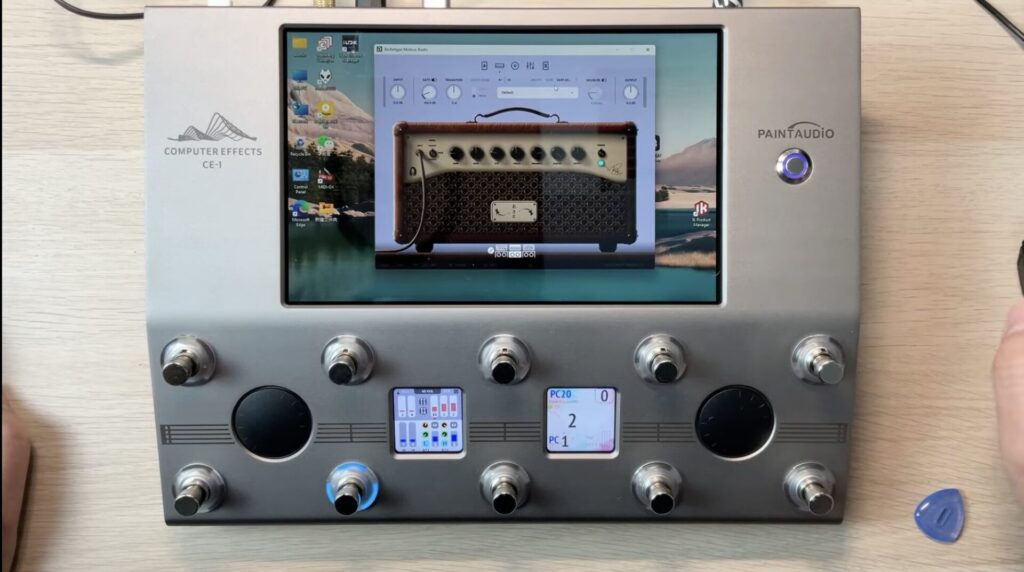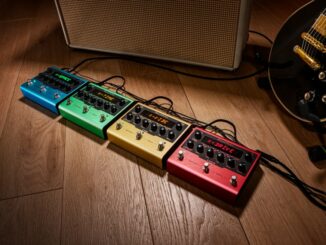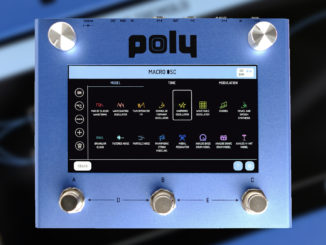PaintAudio Computer Effects CE1 is a new stompbox with a full-featured Windows audio workstation with tons of I/O.
Digital guitar pedals/stompboxes have made a significant step forward in recent years. Thanks to increasingly powerful and more affordable DSPs, the engines have become more complex and of higher quality. See Poly Effects Beebo, it’s a full modular synth in a stompbox programmable with a touch screen.
If you look closely at it and forget about the developers, their work, designs, code, etc., these super complex pedals are just computer systems packaged into a pedal with footswitches. Paintaudio (former Melo Audio) from China has now released the Computer Effects CE1 stompbox, which offers precisely that in a fully customizable format.
PaintAudio Computer Effects CE1
Computer Effects CE1 combines a stompbox with ten footswitches, a computer, a touchscreen, two small screens, and a fully-featured audio interface. The footswitch part is based on their popular MIDI Captain foot controller.
The CE1 stompbox uses a custom mainboard powered by an Intel N200 processor with 6MB cache, up to 3.7GHz, and 16GB of DDR5 RAM. In terms of power, it is comparable to the CPU from the Ableton Push 3 standalone.
However, the N200 came onto the market two and a half years later and thus ran more efficiently. It also hosts a 256GB SSD for storage. A custom heat dissipation system ensures that the system does not overheat.
Windows Pedal
Nice: it runs no special, proprietary software or operation system. It uses Windows 11 and works like a classic computer but in a stompbox.
PaintAudio promises you can install various music software, such as DAWs (Ableton Live, Cubase, Reason, etc.) and VST instruments and effects. Yes, this transforms the Computer Effects CE1 pedal/stompbox into a true hardware VST host.
Unlike many other current VST hosts, this one is based on Windows, which significantly expands the selection of VSTs and has built-in WiFi. This ensures that you can also register payware VSTs. A hardware guitar pedal with ValhallaDSP or Sinevibes effects, here we go.
The hardware is not only suitable for FX setups. The built-in 256GB SSD also makes virtual instrument hosts possible. So, you could create a hardware Synthesizer workstation with various synth plugins.
Tons Of Audio & Digital I/O
There is a lot to check out on the hardware. First, the pedal hosts a large 8-inch IPS touch screen, although Paintaudio doesn’t 100% recommend using it with the Windows operation. They recommend a mouse and a keyboard.
Secondly, you get two additional mini-screens, one for the audio interface and the second for MIDI. Part of the Computer Effects CE1 is also a Paintaudio MIDI captain foot controller with ten MIDI-programmable footswitches and two big circulating sliders.
On the backside, the Paintaudio Computer Effects CE1 offers a lot from left to right. It features four audio inputs (two combo XLR with automatic selection for guitar/mic and two balanced, each with 54dB pre-amp) and four balanced outputs (two XLR and two TRS jacks).
Then, it offers a 5-pin MIDI interface with input and output sockets, two USB hosts/data ports (USB-C/USB-A), two headphone sockets with built-in amplifiers, two TRS expression inputs, a USB-C power port, another USB port for audio interface duties, and a DC 15V power supply.
Further, you can use the USB-C port with an HDMI adapter to monitor the touch screen on a bigger screen.
First Impression
I’ve been waiting for a new Windows-based VST host for a while. Many current ones are based on Linux, which has some disadvantages (VST selection…). I find merging the whole thing into a pedal very exciting. We’ll have to see how well it operates and performs, especially with Windows 11 and Asio drivers.
I currently use my iPad Pro M1 a lot as a synth and effects host with external gear. I wonder how well such a system could replace it or make the whole thing even better since you can use all the regular plugins, like Valhalla DSP, Sinevibes, etc., on standalone hardware.
A downer, however, is the asking price of $1099, which is a bit high. Nonetheless, I’m curious to see more demos from PaintAudio Computer Effects CE1 users. If Paintaudio reads this article, please get in touch with me. I’m very interested in testing it out.
PaintAudio Computer Effects CE1 is available now for ¥8,039.00 CNY/$1099 USD + shipping. Windows 11 is not included in the package.
More information here: PaintAudio







Now we know what Wilson has been up to.
Super interesting device, everything except
the price but with all the features it has, it’s understandable.
While an impressive piece of kit, I’m starting to wonder if there’s any real benefit compared to running one’s sound via an interface into the daw. Two pieces instead of one?
Of course, there are no benefits compared to running one’s sound through an interface into a DAW while using a MIDI pedal. However, the same reasoning applies to all Helixes, Quad Cortexes, Axe-FX units, Boss products, etc. They are all essentially just a computer, an audio interface, and a MIDI pedal.
No benefits? How about smaller, sturdier, fewer wires?
Might be less power, though.
I’ll venture a few educated guesses, based on the above: …
1. Once you’ve configured FX, MIDI & Audio routing, VIs, FX, processing, etc; the dedicated system stays stable; not caught up in a constant gyre of system & software updates….
2. Tight integration of the MIDI Captain– which is a very configurable footswitch system. This makes it really three-pieces vs one. …
3. More rugged build. PaintAudio’s enclosures are pretty amazing. Also, its clear he has a good sense of balancing features and functionality. …
Compared to an all-in-one multi-FX floor unit, the CE1 has much more Audio & MIDI capabilities. I expect latency will be better with a dedicated FX unit. …
If Linux can run on it, I can imagine that could open up another cult following. …
Over the years, there’ve been a number of products that package a computer running a bog-standard OS with integrated hardware. Comparing this to a Zynthian, the CE1 has more/better i/o, no assembly required, more easily configured, less limited by the platform.
This is just the kind of rig I would have lost my mind over, when I was a bit younger & more impressionable. .. but as Orphan suggests, I’d probably be better served by using an existing macbook, an interface and my MIDI Captain.
I want those special audio and MIDI I/O docks for iPad to come back.
The manufacturers were so much pissed by Apple switching to lightning at the time that no one wanted to make another one.
But now with everything gone USB-C for a good while, maybe it’s time to try the concept again.
CME has a range of BT MIDI devices, which you can then connect to your iPad via, well BT. Latency is 3ms aka not noticable.
Witj iOS, latency is cumulative.
I’ve been hoping for (more) products like this to finally come to market, and this does look great. Having said that, it feels expensive.
The PC I’m currently working on has a CPU with double the physical cores and quadrupel the threads, 1 TB SSD drive (so basically quadrupel again) and equal RAM. I paid €1000 for this machine in 2019 or ’20 and that includes the case, a massive powerful and quiet PSU, a Windows license, everything. And I’ve got an audio interface here with comparable IO that costs about €250…
So, I don’t know. Again it looks great and solid and is obviously a very nice tight package, BUT you could build (or have someone build) to spec a small Windows machine and likely get something close to twice as powerful for close to the same price (including a decent audio interface).
This gets into the economics of scale. These units are done in small batches and hand assembled.
$130 for a MIDI Captain, let’s say $250 for a comparable audio-MIDI i/o, also about $50 shipping cost (?); that’s maybe $700 for a fairly customized Windows machine with a touch-screen– arguably not high specs, but that he tested a bunch and found one that was stable and reliable– is worth something.
The Zynthian 5.1 with an 8 GB Raspberry Pi 5 is around $500, but is limited to its own development realm– not stompable.
I’m sure a person could take $1100 and build a comparable system with more boxes connected together by wires and even more power, but it might require lots of trouble-shooting, trial & error, etc. I’m not saying there aren’t risks with this device, but it does sound like they’ve gone through a pretty respectable period of design & field testing.